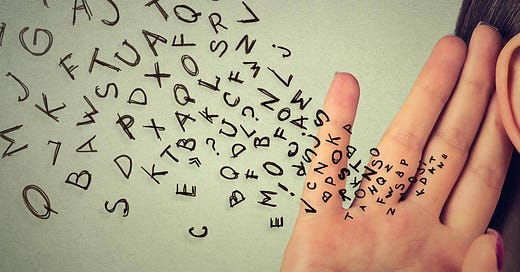I have had several experiences recently where it was clear that people were not listening to each other - like, honestly not paying any attention to what the other was saying, or if they were, refusing to accept what the other was saying. That can be frustrating; in one instance, I felt like Dan Hedaya’s character in Joe Versus the Volcano1, who repeats over and over “I know he can GET the job, but can he DO the job?”
Sigh.
How are we supposed to welcome others, help others, work toward beloved community with others, if we aren’t listening? Heck, how are we supposed to follow instructions or get something done if we aren’t listening? And I get it – sometimes it’s hard to listen, especially when the conversation is hard. Sometimes it’s hard to listen when the context for the conversation is distracting or invites defensiveness. Sometimes it’s hard to listen when the speaker’s words and tone are filled with anger or contempt.
But when it’s just listening to each other share information, or wrestle with a problem, or heal a strained relationship? It matters that we listen. It matters how we listen. And yes, it matter as much in these moments as how we speak.
Quaker author Parker Palmer writes extensively about this in his book A Hidden Wholeness: The Journey Toward an Undivided Life. Now his book is largely about soul-building and small group connections – but what he teaches about listening is invaluable..
Go figure: a Quaker teaching us about listening.
How we listen begins with how we show up. It could be easy to be distracted and not really pay attention; it’s why I like to see movies I’m excited about in the theatre rather than on TV, because I’m primed to show up and pay attention.
Showing up means taking a few moments to center ourselves – however you do that, whether with a deep breath or a settling wiggle, or a few words of positive self talk.
And then we must allow the speaker their time. What I mean by this is that they have something to say, and we don’t know what they’re going to say – even if we think we know.
The next part is the hardest – we rarely listen to hear what someone else is saying; too often we ‘half listen’ while we formulate what we’re going to say, or to correct or advise. When we forget – when we engage in cross talk, in not paying attention, in prejudging someone’s words – we aren’t listening really at all, and that way lies argument and frustration.
How we manage that is fairly simple but effective.
First, we remember what I think of as Parker’s golden rule: no fixing, no advising, no setting each other straight. Listening means we take in what is offered – and then being invited to advise or problem solve when the speaker is ready for that.
Second, we take time. We don’t always hear what is being said until our brain catches up and processes it. So when you are in a focused conversation, allow a few breaths –and maybe even a few more – to let everything catch up. This not only helps you, the listener, but give some space for the speaker to prepare themselves to speak.
What we know is that truth emerges in the silence. Both for the listener, and for the speaker.
This process – especially when having hard conversations – matters.
It matters in one-on-one conversations with someone you’re close to. Or someone you’re doing work with. It matters across your congregation, when you’re solving problems and making decisions. It matters as you consider what radical welcome means, and how you make the conditions right for belonging.
When we listen well, we are invitational. We open ourselves to possibilities. We take ownership of our own behaviors and thoughts. We make room for dissent in respectful ways. We commit, over and over, to coming back to the table, to working together, to finding new ways.
We may not know where our conversation may lead, although we all hope it is toward health and connection. And yes, the road will be muddy and rough, but we will get there. We will find our way.
Just… listen.
PS: You’re welcome for the earworm.
If you don’t know this film, go watch it. It’s highly underrated, but it’s brilliant allegory by John Patrick Shaley (who also wrote Moonstruck and Doubt). Plus, there’s some very funny stuff in it, thanks to Tom Hanks, Meg Ryan, Nathan Lane, Robert Stack, Ozzie Davis, and many others..





I love that movie